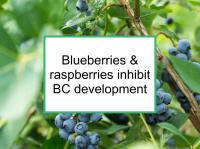Blueberries and raspberries have both been shown to reduce mammary tumor development in animal models of breast cancer. However, their effects on cancer cells are different. While blueberries result in fewer tumors, black raspberries are more effective in delaying the first appearance of tumors in rats implanted with estradiol.
Black raspberries, which are less studied than blueberries, appear to have more cancer-preventative chemicals than red raspberries. While blueberries contain five different anthocyanidins (delphinidin, cyanidin, malvidin, peonidin, and petunidin) and insignificant levels of the flavonoid ellagic acid, black raspberries contain primarily the anthocyanidin cyanidin and high levels of ellagic acid.
Blueberries enhance the treatment effects of tamoxifen
Pterostilbene, a stilbenoid found in blueberries, has been found to inhibit breast cancer cell growth in the laboratory. Pterostilbene has also been shown to have additive effects when combined with tamoxifen in estrogen receptor positive (ER+) breast cancer cells. In one study, hormone receptor positive MCF-7 cells were found to have reduced viability at all time points when pterostilbene was combined with tamoxifen. Cell death detection tests indicated increased apoptosis (programmed cell death initiated to rid the body of defective and other unwanted cells) by the pterostilbene plus tamoxifen combination compared to tamoxifen alone.
Blueberries also might reduce the detrimental effects of obesity
Pterostilbene also has been shown to inhibits leptin-stimulated growth and proliferation of breast cancer cells. Leptin is a fat hormone that has been found to promote breast cancer growth and development in obese women.
Blueberries also inhibit triple negative breast cancer
Blueberry has been shown to exhibit antitumor activity against MDA-MB-231 triple negative breast cancer cells and reduce their metastatic potential. Blueberry extract was found to inhibit cell proliferation in triple negative cells with no effect on normal breast cells in one study. Blueberry also reduced the metastatic potential of triple negative cells through inhibition of cell motility.
In animal studies, dietary blueberry has been shown to reduce triple negative tumor volume in female mice. Blueberry diets reduce triple negative proliferation (as measured by Ki-67) and increases cell death. Analysis of tumor tissues has demonstrated that blueberry-fed mice tumors have significantly altered expression of genes important to inflammation, cancer, and metastasis. In addition, a blueberry diet inhibited triple negative tumor metastasis in one mouse study. In the study, mice fed 5% blueberry developed 70% fewer liver metastases and 25% fewer lymph node metastases than control mice.
Raspberries reduce angiogenesis
Ellagic acid has been shown to inhibit breast cancer in cell and animal studies, in part by inhibiting angiogenesis. In order to grow beyond a very small size, tumors must induce angiogenesis, the growth of new blood vessels. Cancer cells induce angiogenesis during the early stages of tumor development — this is a crucial step that separates preinvasive and dormant forms of cancer from invasive and metastatic growth. Blocking this step is one strategy for fighting cancer.
Please see our articles on what hormone receptor positive and triple negative breast cancer patients should eat for more information.
